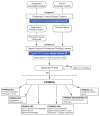Molecular Subtyping and Precision Medicine for Pancreatic Cancer
- PMID: 33406790
- PMCID: PMC7794969
- DOI: 10.3390/jcm10010149
Molecular Subtyping and Precision Medicine for Pancreatic Cancer
Abstract
Substantial progress in recent years has dramatically increased our knowledge of the molecular basis of cancer, revealing new potential therapeutic targets and paving the way for effective personalised medicine for the treatment of many tumour types. However, pancreatic cancer has been lagging behind in this success and continues to be one of the most lethal solid malignancies. Its molecular heterogeneity and the unselected design of the majority of clinical trials to date can in part explain the reason for our failure to make a significant change in the survival outcomes for patients with pancreatic cancer. A changing paradigm in drug development is required to validate the new molecular taxonomy and to rapidly translate preclinical discovery into clinical trials. Here, we review the molecular subtyping of pancreatic cancer, the challenges in identifying effective treatment regimens according to defined low-prevalence molecular subgroups and we illustrate a new model of translational therapeutic development that was established in the U.K. (Precision-Panc) as a potentially effective solution to improve outcomes for patients with pancreatic cancer.
Keywords: Precision-Panc; molecular subtypes; pancreatic cancer; pancreatic ductal adenocarcinoma; precision medicine.
Conflict of interest statement
The authors declare no conflict of interest.
Figures


References
-
- Aguirre A.J., Nowak J.A., Camarda N.D., Moffitt R.A., Ghazani A.A., Hazar-Rethinam M., Raghavan S., Kim J., Brais L.K., Ragon D., et al. Real-time Genomic Characterization of Advanced Pancreatic Cancer to Enable Precision Medicine. Cancer Discov. 2018;8:1096–1111. doi: 10.1158/2159-8290.CD-18-0275. - DOI - PMC - PubMed
Publication types
LinkOut - more resources
Full Text Sources
Other Literature Sources

